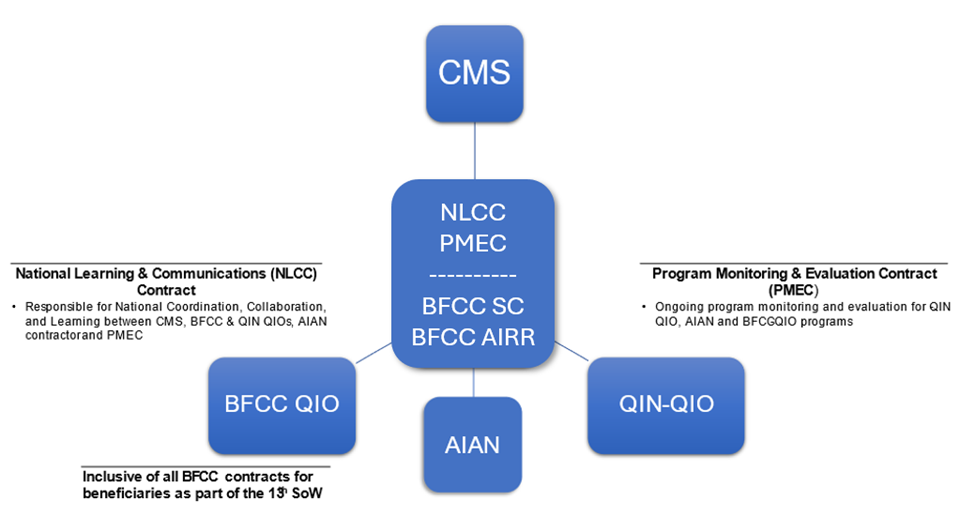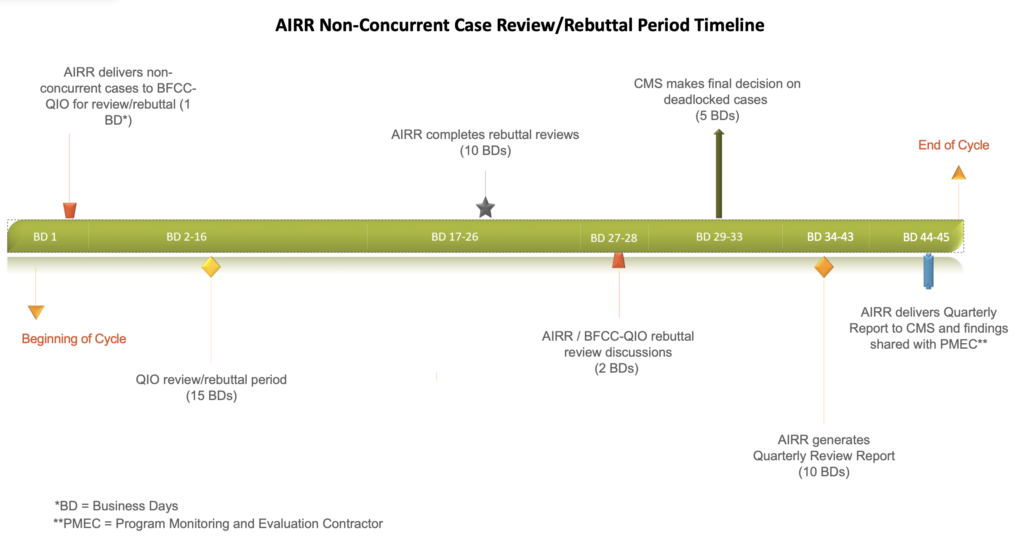For BFCC QIOs
About the BFCC-AIRR
The Beneficiary and Family Centered Care Audit and Inter-Rater Reliability Review (BFCC-AIRR) provides expert healthcare quality improvement (QI) services for Inter-Rater Reliability (IRR) of beneficiary-requested appeals and claims review to support the BFCC provisions of the Medicare Quality Improvement Organization (QIO) Program.
The work of the BFCC-AIRR aligns with and supports the CMS National Quality Strategy to advance toward a more equitable, safe, and outcomes-based healthcare system for all individuals, and is part of CMS’ overall strategy to evaluate programs in the 13th Scope of Work by providing better linkages between the BFCC-QIO and the QIN-QIO activities. (Figure 1).
Figure 1: CMS 13th Scope SoW Program Management Framework

Specifically, the BFCC-AIRR:
Supports measurable improvements in the quality of health care for Medicare beneficiaries.
Supports an effective and impactful evaluation by ensuring that there is accuracy and consistency in beneficiary appeals and claims review disposition decisions by the BFCC QIN-QIOs. A direct impact on ensuring high-quality care.
Enhances patient safety through medical record reviews for preventable patient safety events and the quality of care provided.
Supports an overall strategy for data-driven learning healthcare system for quality improvement.
Safety valve to ensure that Medicare beneficiaries can exercise their right to high-quality healthcare
The BFCC-AIRR also supports CMS’ overall evaluation of the QIO program’s performance by providing valid data to assess the impact of BFCC-QIO review activities on ROI and quality.
Inter-Rater Reliability Reviews
Inter-rater reliability (IRR) refers to the reproducibility or consistency of decisions between two reviewers. The goal of IRR reviews is to ensure consistency in decision-making between the QIOs and the BFCC-AIRR, thus improving consistency in beneficiary appeals and claims review disposition decisions leading to improved quality of healthcare for Medicare beneficiaries. The BFCC-AIRR conducts 2,500 IRR reviews annually for each of the following appeal types:
Medicare Fee-for-Service (FFS) Post-Acute Appeals (formerly referred to as BIPA Appeals)
Medicare Advantage (MA) Post-Acute Appeals (formerly referred to as Grijalva Appeals)
Hospital Discharge Appeals (formerly referred to as Weichardt Appeals)
The BFCC-AIRR also performs 2,500 annual reviews of Part A Short Stay claims.
If the BFCC-AIRR disagrees with QIO’s review decision, these findings are sent to the BFCC-QIO. The BFCC-QIO will review the AIRR’s findings and can initiate the rebuttal process (Figure 2 below) if they disagree with the IRR findings. CMS may convene discussion sessions between the BFCC-AIRR and BFCC-QIO(s) in non-concurrent cases to promote collaboration, communication, and consistency across case and claims reviews. If there is still a disagreement after both parties have met and discussed the reviews, CMS will determine the disposition of deadlocked cases.
Figure 2: AIRR Rebuttal Process

Want to learn more about the Beneficiary and Family Centered Care (BFCC-QIOs)?
CMS BFCC QIO
BFCC-QIOs manage appeals and disputes from Medicare beneficiaries by reviewing the quality of care delivered by hospitals and other healthcare institutions. BFCC QIOs address individual complaints, such as appeals for decisions to be discharged from hospitals and the discontinuation of other healthcare services, as well as any potential violations of the Emergency Medical Treatment and Labor Act (EMTALA). BFCC QIOs also protect the Medicare Trust Fund by determining whether services rendered and paid for by CMS are reasonable and necessary.


Acentra Health BFCC-QIO
Livanta BFCC-QIO

For QSRS Selected Hospitals
The Beneficiary and Family Centered Care Audit and Inter-Rater Reliability Review (BFCC-AIRR) provides expert healthcare quality improvement (QI) services and reviews for preventable safety events to support the BFCC provisions of the Medicare Quality Improvement Organization (QIO) Program.
Reviews for Preventable Patient Safety Events
The BFCC-AIRR’s reviews for preventable patient safety events involve analyzing the results of 2,000 medical record reviews annually to determine trends in patient safety care related to adverse events. Subsequent referrals to BFCC and Quality Innovation Network (QIN) QIOs for follow-up under 42 CFR 476 are made to ensure that Medicare beneficiaries receive high-quality health care.
Patterns of Preventability: Annually, the BFCC-AIRR reviews statistics for individual facilities and/or facility types to identify patterns of care that require referral for technical assistance. Examples of patterns include individual facilities with elevated rates of medical errors or other preventable events and important non-preventable events for which greater study might yield new or improved prevention methods.
Emerging epidemics: In addition to a formal statistical review on an annual basis, the BFCC-AIRR proactively makes CMS aware of any patterns that emerge in real-time. For example, identifying four (4) consecutive preventable patient safety events in the same facility in one week would trigger an alert to CMS.
About the AHRQ QSRS Program
Patient Safety Events and the Agency for Healthcare Research and Quality’s (AHRQ) Quality and Safety Review System (QSRS) Chart Abstraction Program
Medical errors present an ongoing challenge to the healthcare system in the United States. The extent of medical errors in U.S. hospitals was spotlighted over 20 years ago when the Institute of Medicine (now the National Academy of Medicine) published To Err is Human, estimating that nearly 100,000 deaths occurred each year due to medical errors. This led to the development of the Medicare Patient Safety Monitoring System (MPSMS) in 2001, which was replaced by the Quality and Safety Review System (QSRS) in 2020.
The QSRS was designed to identify the occurrence of specified adverse events to gain a better understanding of patient safety in the hospital setting. Currently, data are collected through retrospective manual abstraction of inpatient records. Human abstractors answer questions to identify whether an adverse event occurred during a particular hospital stay. This surveillance measures the magnitude of adverse events among hospital patients covered by Medicare to monitor trends and assess the impact of national patient safety initiatives, with the goal of informing national and local quality improvement efforts.
Has your hospital been selected for the QSRS program?
For more information about the AHRQ QSRS program for hospitals selected for the AHRQ QSRS abstraction program, please visit the following links:
AHRQ – Quality and Safety Review System (QSRS) – An Improved Patient Safety Surveillance System
About CDAC Medical Record Requests for Patient Safety Review
Who do I reach out to regarding record submission specifications?
TiSTA Provider Help Desk:
- CSAC Provider Helpdesk@tistatech.com
- (717) 718-1230 extension 201
